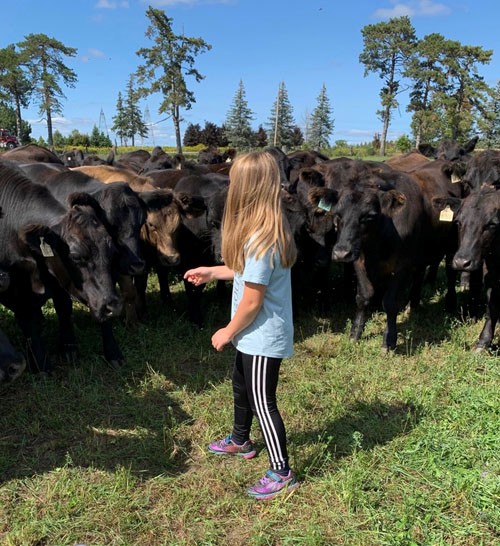Our Breeds of Beef

Raising Angus cattle is a family tradition. Eric's great uncle, James Bowman,
established his herd of Black Aberdeen Angus in Guelph in 1891. He was inducted into the
Canadian Ontario Agricultural Hall of Fame for his contribution to agriculture. Our first Red
Angus cattle were purchased from Roland Bowman another great nephew.

James Bowman with granddaughter at the farm in Guelph.
Black and Red Angus
The Angus are a Scottish breed from the Counties of Aberdeen and Angus in North Scotland.
The development of the breed began in the 1800’s. They either black or red in colour with a polled head, compact and low set body and fine quality flesh. They are also a very calm and good natured animal as shown in the picture of our granddaughter with the herd around her.
The Angus breed are very adaptable to cold climate and because they are herbivores they love to graze forages
so they are very happy to be on pasture as long as they can. Their day is spent grazing and resting. When they rest they rechew
the food they ate earlier. The food is regurgitated as a “cud”and chewed again to help aid digestion.
This breed is very social and so being part of the herd is very important to their well being.
As in the human society there are social hierarchies of dominant and less dominant.
Everyone knows where they fit in and life is good!

|
Philosophy
" To maintain a healthy environment for the current farm inhabitants - cattle, soil and people - and leave an environmentally sound legacy for our successors"
The words " everything old is new again" brings us back to the Bowmanview roots. There have been several eras of transition on the farm.
T. R Bowman commenced organic, J.W. initiated the use of chemicals,
EW continued the trend but started back to growing organically in 2004. AM continued to improve our organic footprint for the next generation Aiden and Emma.
This excerpt from Joni Mitchell's song "Big Yellow Taxi" makes an environmental statement
about the farming community as we know it.
Hey farmer, farmer
Put away that DDT now
Give me spots on my apples
But leave me the birds and the bees
Please!
Don't it always seem to go
That you don't know what you've got
Till its gone.
One of our concerns is the increase in the use of herbicides, synthetic fertilizers, hormone growth implants in animals and feeding cattle with grain-based diets containing antibiotics. The other topic of concern that is discussed around our family table is the fact that many of the small family farms are disappearing and being replaced by so called "agri-businesses" which are factory type operations. These trends are supported by the companies who manufacture the products and who in turn benefit financially.
Organic agriculture will help to leave the next generation a path of ecological foot prints to follow, restore the natural fertility of the soil and improve water quality to make their walk a safer one.
.
|

